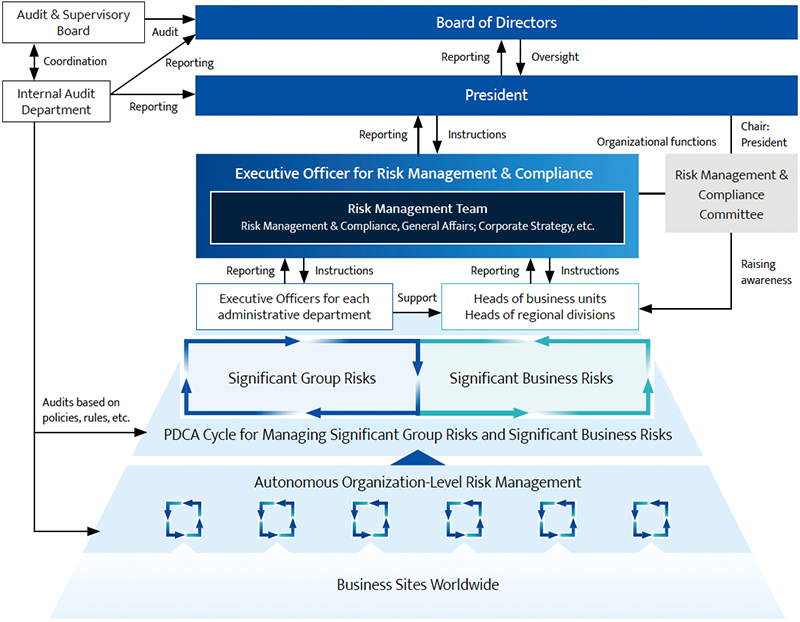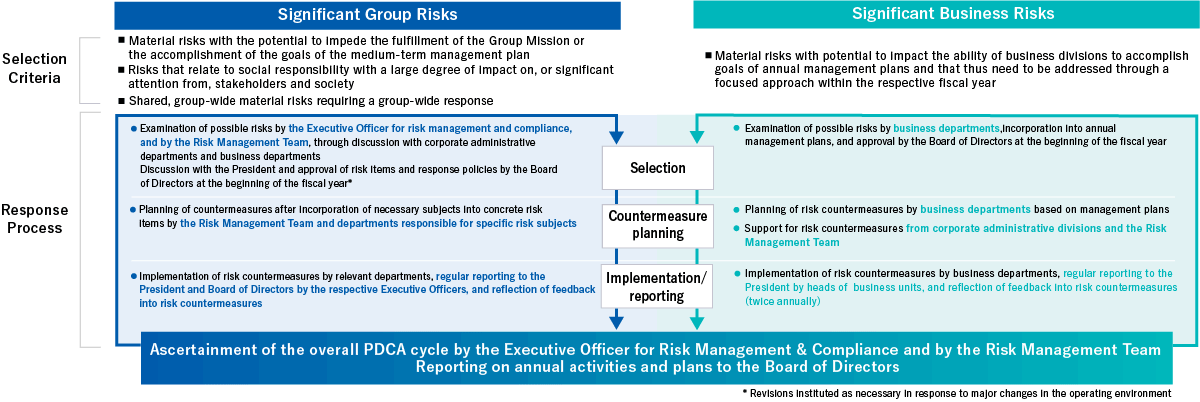Risk Management
Policy
The Asahi Kasei Group has established and is working to reinforce basic guidelines for risk management and emergency response in the Group's business operations in accordance with the Asahi Kasei Group Basic Regulation for Risk Management & Compliance.
Strengthening risk management
While we are accelerating our global expansion in a variety of businesses in three sectors, the business environment surrounding the Asahi Kasei Group has been drastically changing due to the economic decoupling of the United States and China, and growing tensions in international relations such as the situation between Russia and Ukraine, and in the Middle East. New risks and increasingly complex risks are having a greater impact on the Asahi Kasei Group than ever before. As such, we need to visualize the risks group-wide to strengthen countermeasures. To do so, we are promoting concrete measures for the reinforcement of risk management.
Risk Management Framework
Under the supervision of the Board of Directors, the Executive Officer for Risk Management and Compliance assists the President, who is responsible for overall risk management. Under the direction of the President, said Executive Officer ascertains overall risk management and gives instruction and support to each department head (Executive Officers responsible for administrative functions, heads of business units, etc.) regarding risk response measures in each organization. Additionally, a Risk Management Team has been set up under the Executive Officer for Risk Management and Compliance to monitor the activities of each organization within the company and provide support for specific risk countermeasures. The Risk Management & Compliance Committee, chaired by the President, ensures that all organizational leaders are informed of management-level decisions and instructions regarding risk management.
Strengthening the PDCA cycle for risk management
With autonomous risk management by every organization as the basis, the Asahi Kasei Group is working to strengthen its PDCA cycle. Within this, Asahi Kasei has set Significant Group Risks as those particularly important risks that the Board of Directors regularly supervises on in terms of monitoring risk response. We have also defined Significant Business Risks as those that may hinder achievement of the annual management plan in each business unit.
Risk management PDCA cycle (Significant Group Risks and Significant Business Risks)
Significant Group Risks and course of action regarding the principal initiatives in fiscal 2024
| Significant Group Risks | Course of action regarding the principal initiatives | |
|---|---|---|
| Risk of accidents at Japanese and overseas production sites (environmental accidents, industrial accidents, injuries) |
|
|
| Quality fraud risk in Japan and overseas (data falsification, etc.) |
|
|
| Risks related to domestic and international laws, regulations, certifications, and other requirements related to the Environment, Safety, Health and quality assurance | The Environment, Safety and Health |
|
| Quality assurance | ||
| Risks related to economic security and global supply chains | Risks related to tighter economic sanctions and export control regulations (both upstream and downstream) |
|
| Risks related to corporate activities due to geopolitical issues |
|
|
| Risks related to human rights (both upstream and downstream) |
|
|
| Risks related to procurement of raw materials and other materials |
|
|
| Risks related to cybersecurity and the management of technical information | Risks related to cybersecurity and communications infrastructure |
|
| Risks of technical information leakage |
|
|
| Risks related to natural disasters, pandemics, terrorism and conflicts | Head office and office districts (Japan and overseas) |
|
| Manufacturing sites (Japan and overseas) | ||
The following other risks are monitored by the Board of Directors as risks that may have a significant impact on the Group's management.
| Other risks | Course of action regarding the principal initiatives |
|---|---|
| Risks related to M&A |
|
| Risks related to climate change |
|
Risk management system based on external standards
To ensure transparency in its risk management system and reporting, the Group references external standards that include frameworks and standards such as the GRI, the Ministry of the Environment “Environmental Reporting Guidelines (2018),” SASB Standards, ISO 26000, and others.
Handling ESG risks
In light of environmental issues such as climate change as well as changes in industrial structure, decreases in the working population, and so on, it is possible that new ESG-related risks will become apparent from social changes related to sustainability. We address these ESG risks as a vital management issue. In particular, given that our businesses rely heavily on energy, addressing climate change is essential, and we consider it to present both risks and opportunities in terms of management.
Based on this mindset, we conducted an analysis of the risks and opportunities present in the various scenarios that could result from climate change based on their level of severity in keeping with the recommendations of the TCFD (Task Force on Climate-related Financial Disclosures) and devised countermeasures. We are working to make management as well as our business and environmental divisions aware of these results and take appropriate action.
Information Security
Recognizing the importance of countermeasures to protect against information security risks, we established the Asahi Kasei Group Information Security Policy and aim to ensure and further improve information security.
Asahi Kasei Group Information Security Policy
As ensuring information security is an important management responsibility, the Asahi Kasei Group declares that it faithfully applies its established information security policy.
- 1.Compliance
We comply with laws and internal regulations concerning information security. - 2.System Establishment
We have an established system to safeguard information security throughout the organization. - 3.Implementation of Countermeasures
We implement appropriate information security countermeasures corresponding to our information assets to prevent information security incidents. In the event that an incident occurs, we respond swiftly and appropriately, strive to minimize any damage, and endeavor to prevent any recurrence. - 4.Education of Employees
We provide information security training to all employees to ensure full awareness of the importance of information security and the proper use of information assets. - 5.Continuous Improvement
We continuously assess our efforts for information security, and apply improvements as necessary.
Established December 1, 2016
Protection of Personal Information
Asahi Kasei Group is committed to the proper handling of personal information we obtain and use, in accordance with the Asahi Kasei Group Regulation for Management of Personal Information. An information security handbook which describes our rules for handling information is distributed to all employees, and education is performed via e-learning. Furthermore, we made necessary changes to the Asahi Kasei Group Regulation for Management of Personal Information to comply with Japan's revised Personal Information Protection Act that took effect in May 2017.
Response to the EU GDPR
To comply with the General Data Protection Regulations (GDPR) that took effect in the EU in May 2018, we have newly formulated the Asahi Kasei Group Regulation for Management of Personal Information and established the necessary standards and systems.
Protection of intellectual property
The Asahi Kasei Group implements strict measures to prevent unauthorized or unintentional outflow of technological information and know-how in accordance with its basic policy and management standards for prevention of technology outflow. The Asahi Kasei Group also applies internal guidelines summarizing related precautions to take when entering business overseas as well as procedures to ensure the preservation of prior-use rights overseas. The company's internal magazine is used to raise further awareness among employees, and workshops are held for training and education regarding protection of intellectual property.
For more information about our intellectual property, please refer to the Asahi Kasei Group Intellectual Property Report.
Crisis response system
Due to accidents, incidents, or problems, if Asahi Kasei Group operations are significantly damaged or would cause serious adverse effects on the general public, we have a system to establish a group emergency response headquarters which works with the relevant divisions and departments to ensure that the proper response is taken.
In fiscal 2017, we established the Asahi Kasei Group Emergency Response Regulation which stipulates basic policy when an emergency occurs, standards to institute an Emergency Response Headquarters, and the functions thereof.


